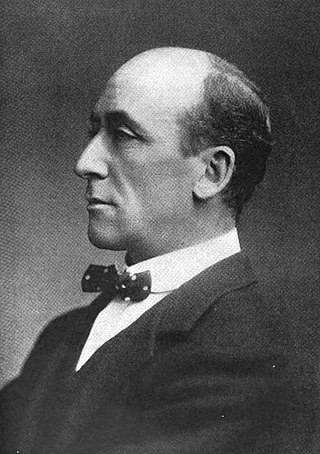
Algernon Henry Blackwood, CBE was an English broadcasting narrator, journalist, novelist and short story writer, and among the most prolific ghost story writers in the history of the genre. The literary critic S. T. Joshi stated, "His work is more consistently meritorious than any weird writer's except Dunsany's" and that his short story collection Incredible Adventures (1914) "may be the premier weird collection of this or any other century".
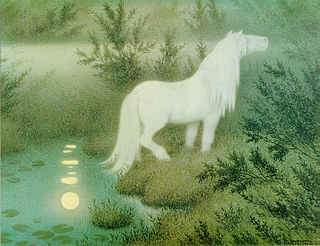
A fantasy world or fictional world is a world created for fictional media, such as literature, film or games. Typical fantasy worlds feature magical abilities. Some worlds may be a parallel world connected to Earth via magical portals or items ; an imaginary universe hidden within ours ; a fictional Earth set in the remote past or future ; an alternative version of our History ; or an entirely independent world set in another part of the universe.
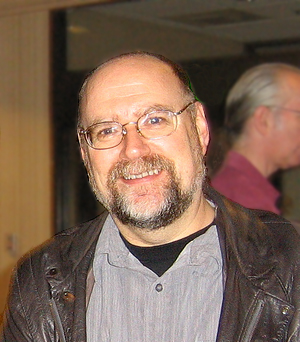
Robert Charles Wilson is an American-Canadian science fiction author.

Strata is a 1981 science fiction comedy novel by Terry Pratchett. It is one of Pratchett's first novels and one of the few purely science fiction novels he wrote, along with The Dark Side of the Sun.
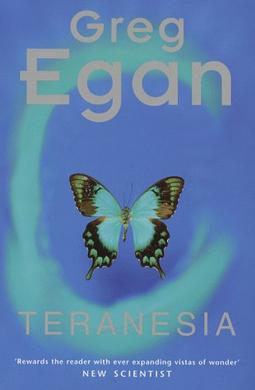
Teranesia is a 1999 science fiction novel by Greg Egan. The novel follows protagonist Prabir Suresh, who lives on an island in the South Moluccas with his biologist parents, who are investigating the unique evolutionary traits of butterflies on the island. As civil war erupts in Indonesia, Prabir and his baby sister Madhusree must escape the islands. When they grow up, Madhusree becomes a biology student, motivated to carry on her parents' legacy in uncovering the evolutionary phenomenon. Prabir reluctantly follows her, as he must navigate and confront the truth that shaped his past.
In American science fiction of the 1950s and '60s, psionics was a proposed discipline that applied principles of engineering to the study of paranormal or psychic phenomena, such as extrasensory perception, telepathy and psychokinesis. The term is a blend word of psi and the -onics from electronics. The word "psionics" began as, and always remained, a term of art within the science fiction community and—despite the promotional efforts of editor John W. Campbell, Jr.—it never achieved general currency, even among academic parapsychologists. In the years after the term was coined in 1951, it became increasingly evident that no scientific evidence supports the existence of "psionic" abilities.
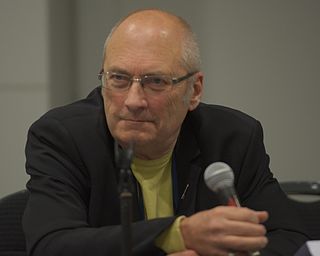
John Frederick Clute is a Canadian-born author and critic specializing in science fiction and fantasy literature who has lived in both England and the United States since 1969. He has been described as "an integral part of science fiction's history" and "perhaps the foremost reader-critic of science fiction in our time, and one of the best the genre has ever known." He was one of eight people who founded the English magazine Interzone in 1982.
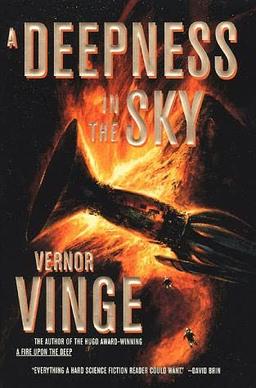
A Deepness in the Sky is a science fiction novel by American writer Vernor Vinge. Published in 1999, the novel is a loose prequel to his earlier novel A Fire Upon the Deep (1992). The title is coined by one of the story's main characters in a debate, in a reference to the hibernating habits of his species and to the vastness of space.

James Henry Schmitz was an American science fiction writer born in Hamburg, Germany of American parents.
A sense of wonder is an intellectual and emotional state frequently invoked in discussions of science and biology, higher consciousness, science fiction, and philosophy.
Planets outside of the Solar System have been featured as settings in works of fiction. Most of these fictional planets do not vary significantly from the Earth. Exceptions include planets with sentience, planets without stars, and planets in multiple-star systems where the orbital mechanics can lead to exotic day–night or seasonal cycles.
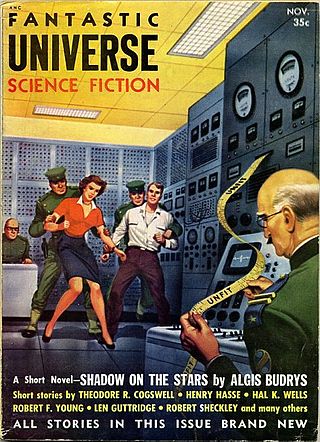
Fantastic Universe was a U.S. science fiction magazine which began publishing in the 1950s. It ran for 69 issues, from June 1953 to March 1960, under two different publishers. It was part of the explosion of science fiction magazine publishing in the 1950s in the United States, and was moderately successful, outlasting almost all of its competitors. The main editors were Leo Margulies (1954–1956) and Hans Stefan Santesson (1956–1960).
The Legion of Space is a space opera science fiction series by American writer Jack Williamson. The story takes place in an era when humans have colonized the Solar System but dare not go farther, as the first extra-solar expedition to Barnard's Star failed and the survivors came back as babbling, grotesque, diseased madmen. They spoke of a gigantic planet, populated by ferocious animals and the single city left of the evil "Medusae". The Medusae bear a vague resemblance to jellyfish, but are actually elephant-sized, four-eyed, flying beings with hundreds of tentacles. The Medusae cannot speak, and communicate with one another via a microwave code.
Paul le Page Barnett, known by the pen name of John Grant, was a Scottish writer and editor of science fiction, fantasy, and non-fiction.
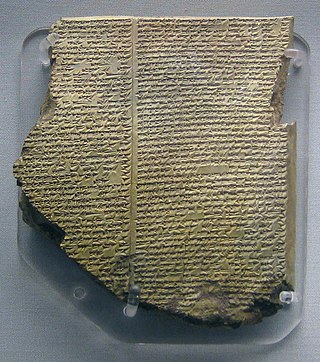
Immortality is a common theme in fiction. The concept has been depicted since the Epic of Gilgamesh, the oldest known work of fiction. Originally appearing in the domain of mythology, it has later become a recurring element in the genres of horror, science fiction, and fantasy. For most of literary history, the dominant perspective has been that the desire for immortality is misguided, albeit strong; among the posited drawbacks are ennui, loneliness, and social stagnation. This view was challenged in the 20th century by writers such as George Bernard Shaw and Roger Zelazny. Immortality is commonly obtained either from supernatural entities or objects such as the Fountain of Youth or through biological or technological means such as brain transplants.

Sir Arthur Charles Clarke was a British science fiction writer, science writer, futurist, inventor, undersea explorer, and television series host.

City at the End of Time is a 2008 science fiction novel by American writer Greg Bear. It was published in August 2008 by Del Rey in the United States, and Gollancz in the United Kingdom. The story follows three drifters in present-day Seattle who are tormented by strange dreams of the Kalpa, a city one hundred trillion years in the future. The Kalpa is attempting to ward off the Typhon, an inexplicable entity that has consumed the rest of the ancient universe and broken down the laws of physics.
Quantum fiction is a genre of speculative fiction that reflects modern experience of the material world and reality as influenced by quantum theory and new principles in quantum physics. It is characterized by the use of an element in quantum mechanics as a storytelling device. The genre is not necessarily science-themed, and blurs the line separating science fiction and fantasy into a broad scope of mainstream literature that transcends the mechanical model of science and involves the fantasy of human perception or imagination as realistic components affecting the everyday physical world.
This is a bibliography of works by Colin Wilson.
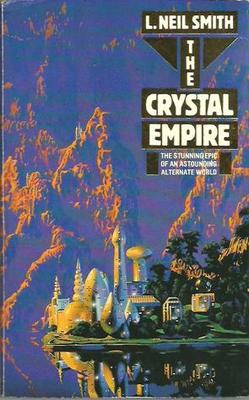
The Crystal Empire is a 1986 novel by American science fiction and alternate history writer L. Neil Smith. It is set in an alternate universe that shares with Kim Stanley Robinson's The Years of Rice and Salt, Robert Silverberg's The Gate of Worlds and Harry Turtledove's In High Places a point of divergence where the Black Death kills much more of Europe's population than it did in reality, opening the way for a Muslim conquest of Europe. The plague also decimates the Mongol Empire, allowing a Mughal power to arise in the Far East in its place.













